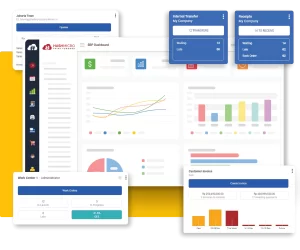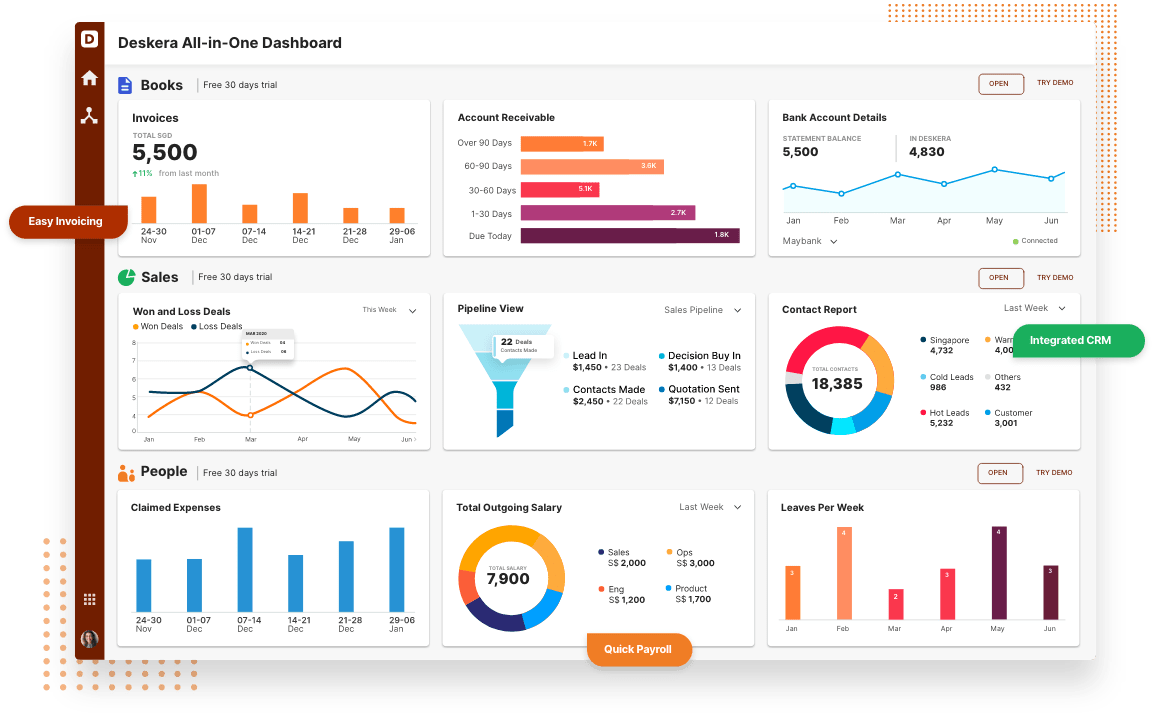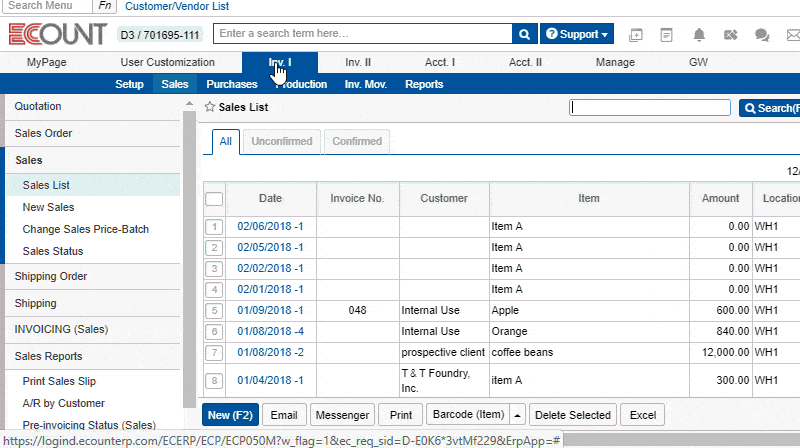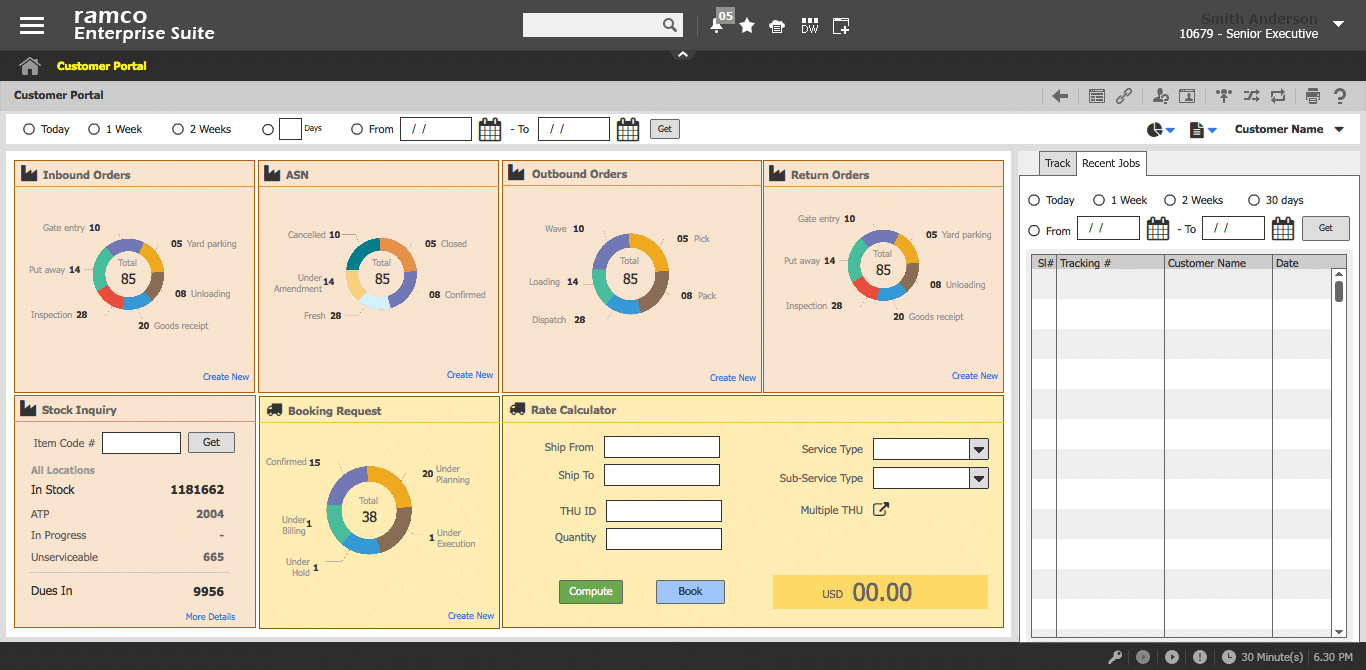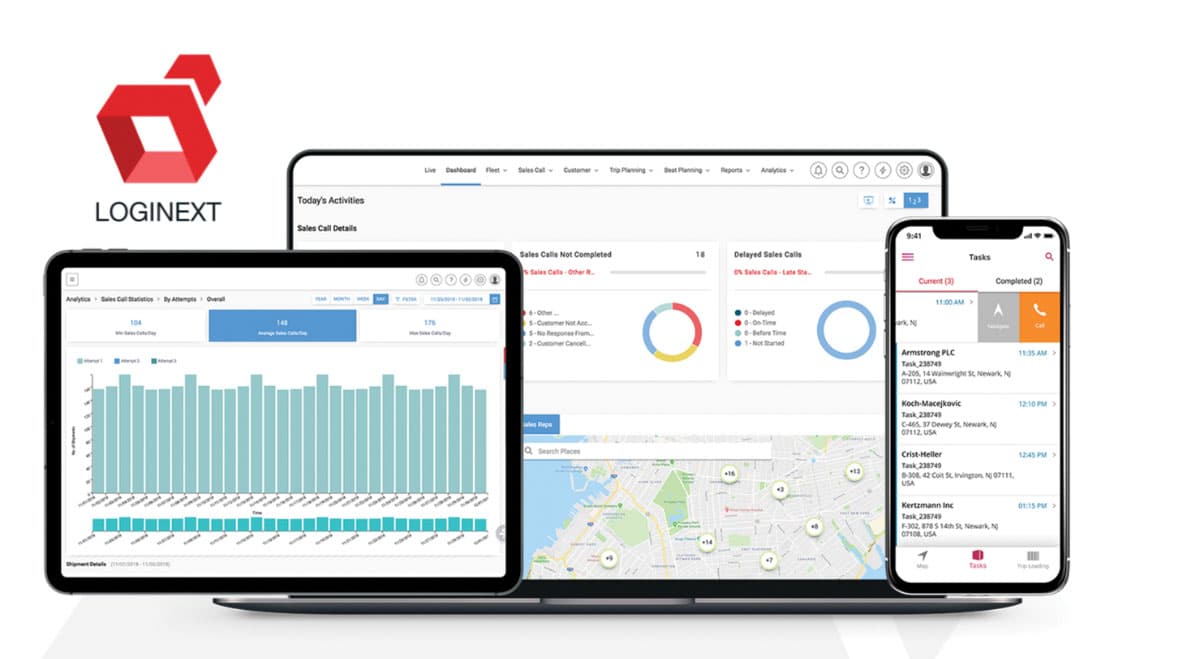In the fast-moving logistics industry, staying competitive requires innovation and strategic technology. A reliable logistics ERP system integrates operations like inventory tracking and shipping, improving efficiency and enabling quick market responses.
As a global trading hub, Singapore relies on tailored logistics ERP solutions to meet local business needs. With HashMicro’s Warehouse Management System, you’ve found the ideal solution to streamline operations, optimize inventory, and boost warehouse efficiency.
This article explores the advantages of logistics ERP systems in Singapore and highlights top solutions, including HashMicro’s comprehensive offerings, to help you find the best fit for your business needs.
Key Takeaways
|
Table of Content:
Table of Content
Logistics Industry Overview
Initially, “logistics” was a military term referring to how military personnel move equipment and supplies. The term is now broadly used in business, particularly by manufacturers. Strengthen your logistic industry by applying the integrated ERP Software in it.
HashMicro is here to offer you help to automate your logistics operations, minimize lead times, and boost customer satisfaction with the most complete Logistics ERP System in Singapore.
Automate your logistics operations, minimize lead times, and boost customer satisfaction with the most complete Logistics ERP System.
Logistics is commonly defined as the process of arranging and transferring resources such as equipment, food, liquids, inventories, materials, and people from one area to the intended destination’s storage.
Challenges of the Transport & Logistics Industry
Following the growth of the transport and logistics industry, there are several challenges faced by the industry. Those challenges may be solved by the implementation of ERP system logistics. Here are the list of the challenges.
1. Inefficient operations
Transport and logistics industry pose significant challenges, notably manifesting in inefficient operations. The lack of streamlined processes can result in higher operational costs, extended delivery timelines, and, inevitably, dissatisfied clientele.
2. Difficult inventory tracking
Another challenge for the industry without using ERP in logistics is ineffective inventory tracking. The lack of streamlined processes makes it difficult to monitor shipments, manage customer orders, and maintain oversight of inventory levels. Consequently, this issue can lead to delays in deliveries and even result in lost goods, ultimately exerting a detrimental effect on the company’s financial performance.
3. High risk of fraud
The transport & logistics industry faces an elevated risk of fraud when operating without safeguarding capabilities. The absence of a centralized database for tracking transactions leaves these companies exposed to potentially crippling fraud incidents. Also, fraudsters find it easy to carry out illicit activities, often escaping detection and causing significant financial harm to the business.
What is ERP for Logistics?
ERP in logistics is software that helps logistics companies manage their operations more efficiently. It streamlines tasks like inventory, packaging, warehousing, and transportation, improving service and reducing costs.
The government launched the Logistics Industry Digital Plan (IDP) as a part of ongoing strategic plans to assist small and medium-sized enterprises in the logistics industry in Singapore. With this plan, the government encourages the industry to adopt more digital technologies and promote digital transformation. The logistics industry trends are contingent upon the adoption of these technology-driven innovations.
One way to make the plan a success is to use a logistics ERP system to manage the company’s growth and operations. This is because management automation with ERP software improves the effectiveness and productivity of a company with minimum risks and costs. How is that possible?
An ERP system brings valuable visibility into different departments and activities, streamlining communication, ensuring data accuracy, and offering comprehensive customer support. By efficiently managing complex supply chains, optimizing warehousing operations, and maintaining accurate records of payments and inventory, ERP software provides logistics companies with accurate data analytics for future planning.
ERP system provides accurate and real-time data that assist decision-makers well quickly and correctly. They don’t have to wait for information and feedback because all business operation history is already on the system. So, the problem-solving decision can be applied sooner before it costs the company a huge amount. With the right ERP software, you are able to manage your business in a better way, especially with the best ERP software from HashMicro.
Also read: Logistics Definition | Challenges and Solution
Key Features of ERP for Logistics
ERP in logistics contains some beneficial features that can streamline the operations of the transport and logistics industry. Explore the important features here.
1. Vehicle tracking
Vehicle tracking stands as one of the important features of an ERP system logistics. With real-time tracking capabilities, transportation management becomes more efficient, allowing for optimized route planning, effective vehicle utilization, and monitoring of driver behavior. Furthermore, the tracking data proves invaluable in enhancing customer service, enabling the provision of estimated arrival times for deliveries, thereby fostering improved communication and customer satisfaction.
2. Load planning
Load planning functionality enables companies to optimize the loading of goods onto vehicles, ensuring maximum capacity utilization and minimizing transportation costs. With the ability to analyze various factors such as shipment size, weight, and destination, logistics professionals can create well-organized load plans that enhance overall efficiency and reduce the number of trips required for delivery.
3. Reporting and analytics
Through accurate reporting and analytics, the ERP system becomes an invaluable tool in assessing the overall performance of the transportation system, paving the way for continuous enhancement and heightened operational excellence. These capabilities empower logistics companies to harness data-driven insights, facilitating the identification of trends and areas for improvement within their transportation operations.
How Can ERP Help the Logistics Industry?
Every logistics company must have different ways of managing its business. The customization of ERP software allows companies to have a system that adjusts to how the company runs. ERP system encompasses such as:
1. ERP controls inventory
Because ERP centralizes its data, all information necessary for a logistic company can be accessed in one place – including orders, inbound and outbound sales, delivery, and more. It allows the company to have future predictions of sales and delivery time.
Analytic data from the ERP acts as valuable business intelligence to the company. ERP systems in supply chain management can identify various activities. For example, out-of-stock inventory, handling inbound from the suppliers and outbound to the customers. Everything is accessible from every device.
In addition, to optimize inventory levels, monitor the stock transfer process, estimate inventory needs, and effectively manage stocks in each location, you can also use inventory software. With inventory software, you can Fulfill demands with optimal inventory levels, monitor stock transfers, forecast inventory requirements, and optimize stock management across multiple locations.
Click the banner below to view the pricing scheme for HashMicro inventory software and understand the costs associated with using this software.
2. It improves distribution
Distribution is an essential part of the logistics industry because it includes the flow of goods delivery and transportation management. ERP software provides solutions to organize the distribution effectively by gathering all information needed in the central hub.
This information is fruitful in improving the handling and delivery of the goods and ensuring they arrive on time. ERP system in supply chain management also facilitates communication between suppliers, distributors, retailers, and drivers to share real-time information. It can be the destination address, such as GPS, detailed information on the products, which helps you to manage your warehouse production well, and many more. With the right Warehouse system, you are able to manage your warehouse in a better way, especially with the most complete Warehouse Management System in Singapore.
3. Effective staff management
ERP system simplifies tasks related to employee management. As a result, the HR staff can manage employees’ working hours, rest hours, leave, and employee performance automatically. Cloud ERP provides companies with layers of security.
Furthermore, it also provides backup data for information such as payrolls, contracts, personal info, attendance, etc. So, the user will always have the data just in case there’s a power outage, natural disaster, or security breach. It will encrypt data to prevent data theft and illegal access. You can also find out about the sale system pricing scheme calculations to help you decide which software suits best to your company.
Also read: How to Optimize the Transport Management in Your Logistics Business
4. Increase customer experience
By delivering a positive customer service experience and improving customer satisfaction, companies can foster customer loyalty and gain valuable word-of-mouth referrals. The implementation and usage of ERP software enable logistics businesses to gain a deeper understanding of their customers’ needs and preferences, thereby allowing them to provide a more personalized and tailored experience.
Understanding the ERP meaning in logistics is crucial, as it helps streamline operations and enhances the overall customer experience. With ERP systems, companies can efficiently manage their resources, track shipments in real-time, and optimize supply chain processes, which all contribute to a smoother and more satisfying experience for customers.
This comprehensive approach not only meets customer expectations but also anticipates their needs, leading to higher retention rates and positive recommendations.
5. Control staff efficiency
ERP empowers logistics companies to monitor and manage various aspects of driver performance seamlessly. With access to up-to-date information, drivers can make informed decisions, optimize their routes, and respond swiftly to changing conditions, ultimately enhancing their productivity and efficiency.
The ability to digitally display real-time data enables drivers to stay well-informed, enabling them to perform at their best and contribute to the overall streamlined operations of the logistics company. Through the strategic implementation of ERP, logistics businesses gain greater control over driver productivity, leading to improved service levels.
5 Best ERP for Logistics Solutions
To maximize the benefits of logistics ERP, implementing the right ERP solution that suits your business requirements is important. Below are the 5 ERP in logistics recommendations.
1. HashMicro
HashMicro offers an advanced ERP in logistics solution, providing complete visibility and advanced analytics to keep up with fast-paced logistics markets. With this solution, businesses can efficiently plan, source, deliver, and forecast products at the right time, ensuring on-time deliveries and improved customer satisfaction.
The software’s multi-warehouse support eliminates human errors, effectively tracking warehouses in multiple locations. Through automation, bottlenecks in the supply chain are eliminated, enabling businesses to meet customer orders swiftly. Sales forecasting also becomes seamless with automatic predictions, allowing companies to adapt to the ever-changing market landscape.
HashMicro’s ERP system logistics comes equipped with essential features such as inventory management, which enables tracking, locating, and adjusting inventory to avoid risks and errors. There is also procurement management which sends automated purchase orders to suppliers when stocks reach the minimum level.
Moreover, order management provides real-time order status updates, facilitating more effective order fulfillment. Then, it provides shipment tracking which ensures that customer orders are delivered on time by allowing businesses to locate courier whereabouts. Additionally, the software’s planning & forecasting feature helps businesses forecast future demand and inventory needs through advanced analytics.
With an affordable price and customizable system, you can achieve your goals and streamline any complex processes. To make sure the software will fulfill your requirements, you can try the free demo service to gain insight into its overall dashboard.
2. Deskera
One of Deskera’s strengths lies in its ability to revolutionize inventory management. Through real-time data analysis, businesses can accurately forecast demand, optimizing stock levels and ensuring efficient material flow through warehouses. Advanced tracking of inventory levels enables cost control, reducing overstocks, and mitigating stockouts, resulting in better resource management and higher profitability.
3. eCount
eCount prioritizes compliance and security, offering robust features to ensure adherence to industry regulations and standards. Sensitive information is safeguarded through stringent data protection measures, protecting against unauthorized access and cyber threats. With timely and accurate reporting for regulatory authorities, businesses can operate confidently in a secure environment.
4. Ramco
Ramco’s mobility feature empowers drivers with a dedicated app that enables trip management, approvals, invoices, alerts, and proof of delivery, promoting real-time communication and data exchange. Moreover, the pre-built tendering module helps businesses overcome capacity crunch by efficiently releasing tenders and accepting quotes, ensuring a smooth and reliable logistics network.
5. LogiNext
With its line haul software, LogiNext empowers businesses with real-time visibility over shipments, ensuring seamless delivery management in today’s fast-paced logistics industry. The carrier management marketplace, coupled with innovative features like 3D packing optimization, capacity utilization, trip planning, and scheduling, revolutionizes the supply chain, making each shipment more efficient.
Conclusion
The logistics industry can operate well if there’s an attempt to streamline the purchasing, transportation, and inventory in every related business. So, the easier information access, the higher the profit that the companies and their customers will achieve.
Therefore, the ERP system has a lot of advantages for every stakeholder in the logistics industry. For that reason, our ERP software can help you streamline your business processes & drive your company’s growth significantly.
You can also choose the right ERP vendor after calculating the ERP software pricing scheme. Tell us about your type of business and industry and we will offer you the best business solutions. Or you can go ahead and try the free demo.








